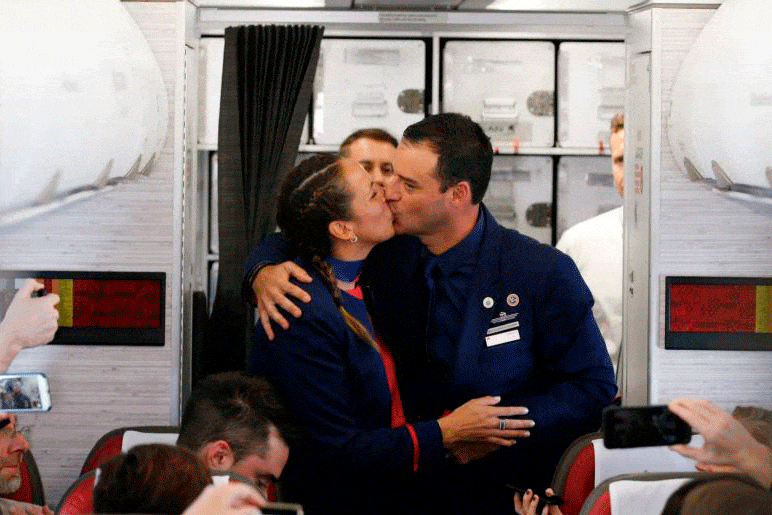
Question: You may have read the account of Pope Francis marrying a couple on a plane. It made me wonder in what circumstances it would be permissible to conduct a wedding in a place other than a church.
To remind our readers, Pope Francis did indeed celebrate the impromptu wedding of two flight attendants on the papal plane during a flight over Chile from Santiago to Iqique. The couple were seated next to the Pope for a group photo and the Pope asked if they were married. They answered that they were married civilly but their church wedding was cancelled when the 2010 earthquake in Chile destroyed the church where the wedding was to take place. The Pope offered to marry them and they readily agreed. He then conducted the ceremony and blessed their rings. The CEO of the airline acted as the witness and one of the cardinals drew up a wedding certificate on a piece of paper from the airline, and they all signed it.
The Holy Father commented afterwards: “This is the sacrament that is missing in the world, the sacrament of marriage. I hope this motivates couples around the world to marry.”
It was indeed a unique wedding, not the sort that would be contemplated in canon law, but then the Holy Father is the supreme legislator in the Church, and the one who makes the rules can also dispense from them. Normally before proceeding to marry a couple the celebrant would spend some time with them, making sure they understood and agreed to live by the commitments of Christian marriage, he would check their birth and baptismal certificates, etc.
Does canon law provide for marriages to be celebrated in a place other than a church? It does, in canon 1118 of the Code of Canon Law. The first paragraph of the canon stipulates that a marriage between two Catholics or between a Catholic and a baptised non-Catholic is to be celebrated in the parish church, but by permission of the local Ordinary or the parish priest it may be celebrated in another church or oratory. The second paragraph says: “The local Ordinary can allow a marriage to be celebrated in another suitable place.” The third says that a marriage between a Catholic and an unbaptised person “may be celebrated in a church or in another suitable place.”
The distinction is thus made between a sacramental marriage, between two baptised persons, where the permission of the bishop is required to celebrate it outside a church, and a non-sacramental marriage, when one of the parties is not baptised, where the priest or deacon officiating at the wedding can authorise the celebration outside a church.
The mind of the Church is clearly that a sacramental marriage ought to be celebrated in a sacred place, like a church or oratory, and indeed most Catholic weddings celebrated by a priest or deacon are conducted in such a place. In this way the very setting of the wedding is sacred, reminding the couple and those attending that the couple are committing themselves before God to be faithful to each other, and they are asking God’s blessing on their marriage.
In what circumstances might a wedding be celebrated in another place? An obvious answer is the case of a marriage between a Catholic and a baptised non-Catholic, where permission can be given to celebrate the wedding in the church or place of worship of the non-Catholic. It should be remembered that the bishop can also grant a dispensation to allow a mixed marriage to be celebrated by a non-Catholic minister (cf. can. 1127, §2). This could happen, for example, when the non-Catholic’s father was a minister and he wanted to officiate at the wedding.
Other circumstances might be the sickness of one of the parties, which could warrant the wedding taking place in a hospital or a home; the danger of death of one of the parties, where the wedding could be celebrated in any suitable place; the celebration in a home in the country if there was no church in the vicinity or if a family member was housebound, etc.
What would not be acceptable is a wedding celebrated, for example, while sky-diving or under water or at a beach, simply because the couple liked these activities. It would make a mockery of the sacred nature of Christian marriage.
